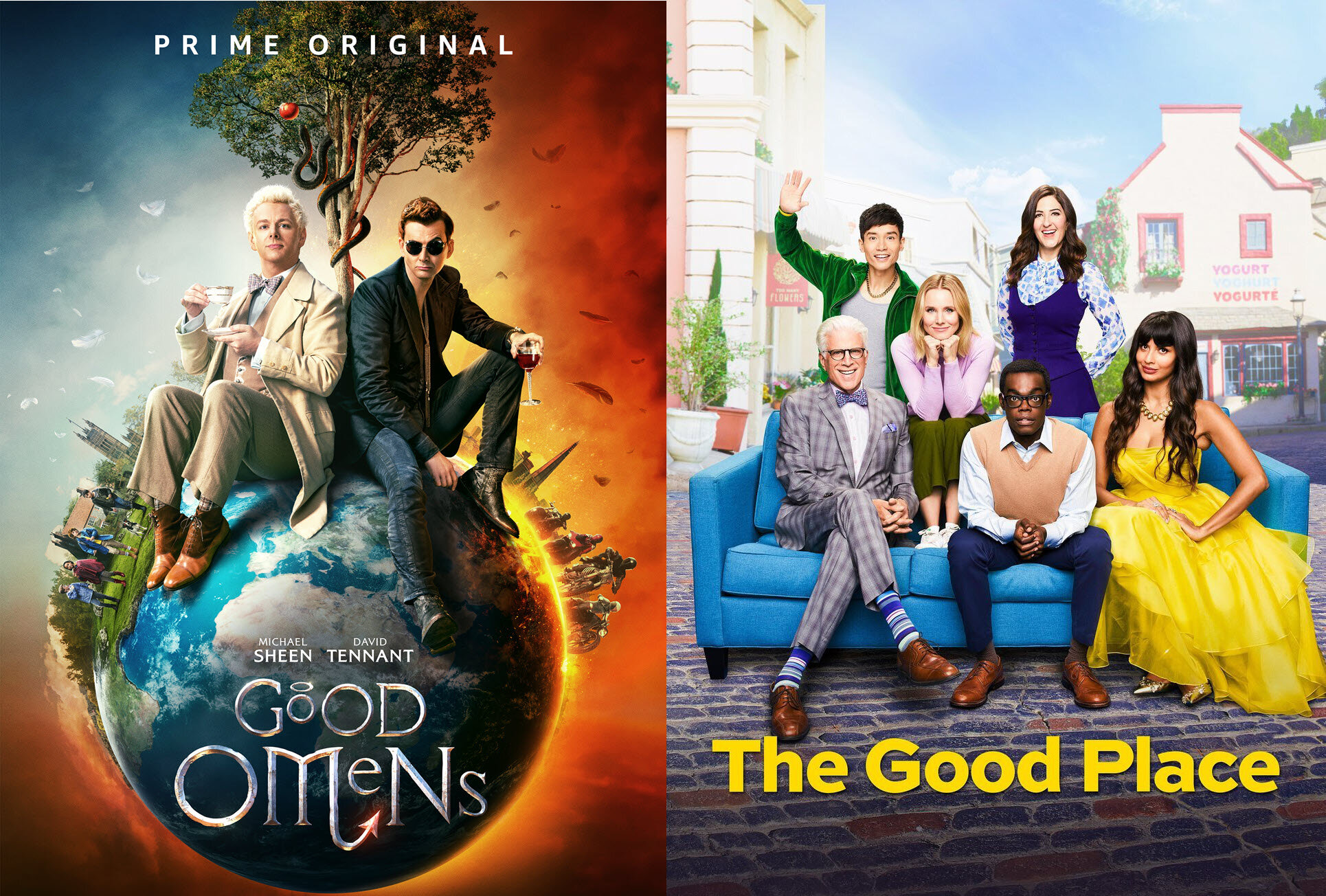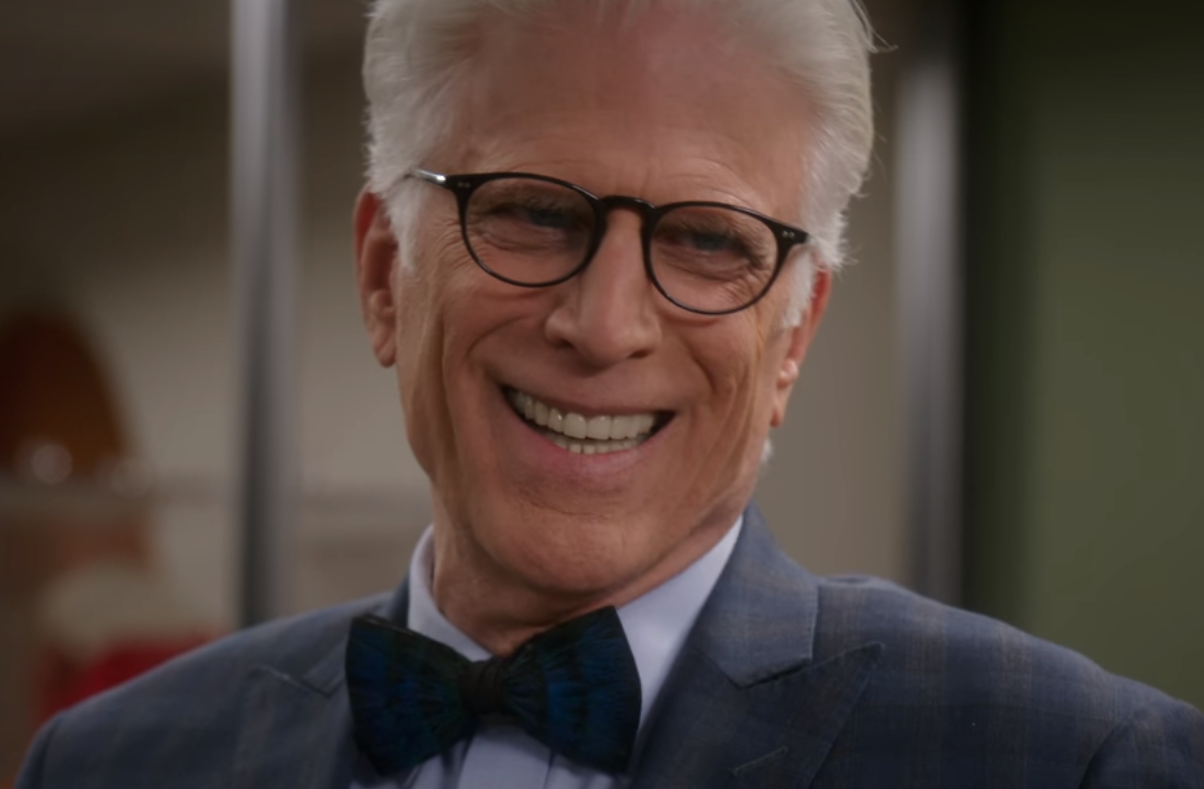The Fiction Unbound editors tackle the ethical frameworks, thematic similarities, and intriguing links between television series’ The Good Place (TGP) and Good Omens (GO). In a virtual book club setting, let’s see what these ambitious shows have in common and decide if the issues they address hit a nerve in our society today.
[Editors’ note: *** spoilers for both works abound—like, a lot of them, we’re not kidding—you have been warned. If you are not caught up on the show and do not experience all-time simultaneously, read at your own peril ***]
Lisa Mahoney: So Danyelle, convince me that The Good Place is the greatest TV series of all time. You seemed adamant about that the other day, and we three agreed to discuss it.
Danyelle C. Overbo: I honestly believe that TGP might just be the pinnacle of television, period. It’s hard to explain why I feel that way without resorting to pure gushing. Every time I re-watch it, I feel like they had a sense of exactly what they were going to do right from the beginning, and they did it. I kept feeling like it would fall apart, but it hasn’t. It has actually gotten better and better - no small feat given that they are essentially breaking down and trying to answer the ultimate questions of the universe. What is good? What is bad? What does it mean to be human? Not only is it successfully tackling some of the hardest questions philosophers have struggled with forever basically - they succeed at all the most important elements of storytelling: character development, plot arcs, world-building, etc. Of course, we still have a few episodes left, so the ending will definitely affect this, but they’ve earned my faith. I think they can do it.
C.S. Peterson: I think TGP and GO have both touched a social nerve. We are awash in the ethical and social anxiety these shows explore. But more than that they provide a lot of laughs, and, though the central relationships are fraught, they are also compassionate and loving. Quite a trick to get that all in one episode!
LM: So true. The laughs are generated by comic plot twists or the characters’ antics, not by mean-girl, cruel interpersonal barbs. The writers let the characters care about and sacrifice for each other in meaningful ways.
DCO: It’s beautiful. I think GO does this really well, too.
CSP: The undercurrent of anxiety is another source of humor in both, but in TGP it also clued me in that Eleanor and Chidi were not actually in a Good Place long before Season One’s finale. Plus, clowns started as demons so...
LM: You guessed that early? Wow! Have you read too many sci-fi short stories with surprise twist endings? Makes you suspicious? The finale of Season One surprised me but only for a moment. Seemed so obvious in retrospect. How do they get four seasons out of that idea?
The brilliant Ted Danson as Michael the Demon in The Good Place at the Season 1 revelation that the characters are, in fact, already in The Bad Place and being endlessly tortured.
CSP: Yup, naturally suspicious. And the first episode had a real No Exit vibe - I mean if Sartre had a sense of humor. And this next episode in January is titled “Help is Other People” which is a play on “Hell is other People” from No Exit.
DCO: I was surprised by Season One’s finale. I was surprised, but then you wonder, are they going to lean on these twists too much in future seasons? Are they going to rest on their laurels? Every single step in each episode of TGP is planned out and plays out so well. Only after you get to the end do you realize how well planned it really was. I don’t want to ruin it for you Lisa, because you’ve only just ended Season One. I think we won’t, though, and it’s still so worth watching because you can know how everything turns out and still enjoy the ride. How we get from where you are to where they are in Season Four is bonkers. Completely bonkers!
LM: I truly admire humor in writing, any kind of writing. I think it is much harder to be funny in written words than when you see actors using voice pitch and gestures to assist funny writing. GO is also funny in print. Terry Prachett and Neil Gaiman did excellent work together.
CSP: I love the adaptations of other Prachett novels too: The Color of Magic, and The Hogfather. GO is lots of fun. David Tennet and Michael Sheen are brilliant together, and they look fabulous. Who knew Tennet would rock it as a ginger?
DCO: Tennet can rock basically anything as far as I’m concerned. Yum. I’m not a fan of Gaiman, but GO was a good fantasy watch. Really solid. Fans of fantasy have lots to love in both GO and TGP. I guess I connect more to TGP because of how well they incorporate all these insane moral philosophy questions into the story.
CSP: It is a great series. The Janets, season three, episode ten of TGP, just won a Hugo this fall. The episode is a blunt challenge to the cop-out of simplistic absolutism in a complex and interconnected world. The question in The Janets is “how many good points or bad points does a human earn for each action.” In the past giving your mother flowers was an absolute good. Now you can’t even give your mother flowers without endangering the diversity of species through monoculture farming, and contributing to the climate disaster as the flower delivery truck pumps out greenhouse gasses into the atmosphere. No wonder no one’s gotten into the Good Place for the last 521 years! And the “Jeremy Bearimy” episode was nominated too. I have so many favorite moments in that show: Chidi quoting Nietzsche to the drug dealer, his student asking, “Will this be on the test?”
Incredibly talented D'Arcy Carden portrays Janet and, in this Hugo winning episode, four other characters as "Janet” in The Good Place.
LM: Characterization is superb in both stories. I love the way we see snippets of how Crowley and Aziraphale grow to trust each other over time and reach agreement that they’re going to stop the end of the world together. It’s just enough backstory to make their current relationship real but not bog us down.
DCO: Ironically it is Crowley, the fallen angel, who is the good guy. Aziraphale is a douche! He betrays Crowley constantly. It drove me crazy.
LM: I wouldn’t go that far about Aziraphale, but at a key moment he does hide Agnes’s Nice Prophecies from Crowley while Crowley is running around endangering himself trying to stop the End. Aziraphale totally lets him go off track. So here you have the angel doing “bad” and Crowley doing “good.” But what they really want is to keep hanging out with the humans they’ve come to understand during their 6,000 years on Earth. They like human civilization, and fallible humanity, better than their own kind. They both avoid their angelic or demonic comrades, and both try to explain the finer points of humanity to their coworkers, who are absolutists, as Catie pointed out. Are they really doing “good” by stopping the battle? As TGP asks, are you really doing “good” when your good deeds are in your own interest or to build your own merit, as a Buddhist might phrase it?
DCO: I love that. I didn’t see how similar the premises of both TGP and GO were. They both deal in the big questions: what is good and what is bad?
LM: Okay, so now let’s turn to other common themes, and what they are trying to say to us and about the world.
CSP: In both shows rigid dogmatists run the cosmos. The point system in TGP is evil . There is no room for mercy or compassion. In GO the last war is going to happen only because it’s part of some inevitable plan.
DCO: I’m not sure the point system is “evil” per say, but for sure there is no compassion. It’s a system of absolutes. No nuance. That’s a great point about GO. Both sides are so gung-ho about this great war, no one stops to ask if that’s actually what this “ineffable” planner wants. Another connection between TGP and GO - both have these god-like presences (GO more so obviously) who do not bother to step in and answer these big questions for the characters.
CSP: In the “Jeremy” episode, Chidi quotes Nietzsche and sets forth the thesis for the rest of the series:
“God is dead. God remains dead. And we have killed him. What festivals of atonement, what sacred games shall we have to invent?”
Now that the institutions have failed, he’s woke. But he’s also in a panic. If there’s no plan then it’s up to humanity to invent the meanings of right and wrong, and that’s terrifying to him.
DCO: Chidi’s whole thing is asking, “What do we owe each other?” I love, LOVE his evolution through the series.
LM: So in both series we see that the entity who set this grand plan into motion is no longer involved, or, cannot adapt to a changing playing field and evolving human players. Aziraphale tries to explain away the presence of evil when God is supposed to be all-good and all-powerful by sort of shrugging and repeating that the plan is “ineffable.” But ineffability is a lame excuse for evil, and even Aziraphale questions how this could be right from the very beginning of the story.
Michael Sheen as Aziraphale (left) and David Tennant as Crowley (right) in Good Omens discussing the ineffable.
CSP: We assume that we are capable of comprehending everything in the universe. Or at least some people, who do the math of string theory and the like. But what if it really is ineffable? What if humans are no more capable of understanding it all than my cat is capable of reading Infinite Jest? Both shows hint that what matters are relationships, compassion, mercy, loyalty.
DCO: Crowley uses that word “ineffable” sarcastically to point out the silliness of the whole thing, but then, in the end, they are able to use it to stop the war. This ambiguity.
CSP: Also, in both shows the denizens of Heaven and Hell are depicted as equally arrogant, powerful, petty bureaucratic bean-counters. Heaven and Hell in both are monolithic institutions, devoted to extreme and incompatible positions. In GO, both sides can’t wait for the promised Final Battle, and the bean-counters have no compassion or connection with the humans whose fate they hold in their sway. There’s a long literary tradition of portraying Hell as a bureaucracy. In pop culture too. It’s in Beetlejuice, and Forgotten Tune for the Flute. There is a strict demonic bureaucratic hierarchy in CS Lewis’s “The Screwtape Letters” too. If you get a chance, listen to Screwtape narrated by John Clease. Bureaucracy has never been so dark, or so funny.
LM: I think another thing that unites these two series is they outright tell you what ethical standard they are going to examine in the episode or book. In TGP Season 1, Episode 6, there is a thesis statement that Chidi cites in the beginning of the episode. He refers to contractualism. He says that if you make a promise to help someone, you should do it. Right away Eleanor replies with an example of when she tried to help someone but it backfired, and so she concludes she can get around another, earlier promise. She has to work through the concept the hard way, and so do we.
CSP: And in GO they tell you right in Chapter One what the book will be about -- can demons do good, can angels do bad?
In Good Omens, Aziraphale gives his flaming sword away to help Adam and Eve. Is he wrong? Is he right?
LM: Right, and when, to help Adam survive, Aziraphale gives away the fiery sword God gave him to guard a gate, is he doing wrong? When Crowley encourages humans to learn the difference between good and evil by telling Eve to eat the apple, isn’t he doing the right thing by them, if not by God?
DCO: I find Crowley’s whole approach to anything remotely sacred really refreshing. A lot of the humor is in learning how all the “evil” things the devil did in the Bible were just Crowley trying to be nice. Like when he’s telling Aziraphale about how he showed Jesus all the kingdoms of the world because the poor boy hadn’t gotten out much. So good. And, as long as you’re not one of his plants, he seems like such a nice, sweet guy.
CSP: Meanwhile the absolutist bureaucrats of the Good Place and the Bad Place are completely detached. They’re judging humans without any context for human experience. Same thing with GO: there’s the heaven people and the demon people, neither of whom have connection or compassion for humanity. To them, humans are merely the means to the end, and it is THE END, the big battle both camps of extremists are salivating after. The poor little mortals are caught in the middle between everlasting powers that do not care for them. All humans really have is each other. GO ends up there too: there’s no grand battle. We have to work together to figure it out.
DCO: Exactly! Working together. It’s our relationships that we have to depend on, which I think is where TGP will end up with a future episode titled “Help is Other People.” And what’s really interesting is that GO is the same. It is centered on the relationship between Aziraphale and Crowley. Their relationship defines them, whether Aziraphale likes it or not. It’s also what enables them to stop the end of the world AND saves their asses after they succeed.
LM: Yes, the power of friendships allow the protagonists to succeed in saving the world but friendships are also key to minor characters. In GO Adam realizes that friendship is more important than the absolute power being offered to him by the “bad” side. He realizes his real friends are his buddies, not the four horsemen. The power of the combined imagination of the friends overcomes impossibly strong foes. When Adam decides a stick is a sword, it acts like one in part because his friends’ belief in him helps him carry the day.
CSP: Adam says he wants to live, to be with his friends. He makes this the story he chooses. The power of story can create a world.
LM: But not necessarily the first world Adam thinks that his friends would want him to create for them. They help him realize that it is not correct to impose a single group’s ideas on all of society.
CSP: It’s the interpersonal relationships between the protagonists that make both stories interesting and satisfying.
DCO: I love it. It’s so meta for us as writers and storytellers.
CONCLUSION
DCO: I am very excited to see the last few episodes of The Good Place to see if I’m right. I have faith that Michael Schur will bring it home. He’s got some of the best television I’ve ever seen (Parks & Rec, Brooklyn 99) under his belt. It doesn’t surprise me he was willing and able to take on what he’s accomplished with The Good Place. I’m really glad that we talked, too. Now that I see Good Omens through its connections to The Good Place, I can appreciate it a lot more. The two are linked more closely than I thought. It all boils down to the relationships - the ones between characters and, in greater theme, the ones we have with each other.















Cadwell Turnbull's new novel — the first in a trilogy — imagines the hard, uncertain work of a fantastical justice.